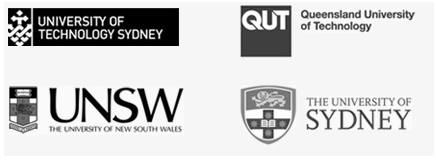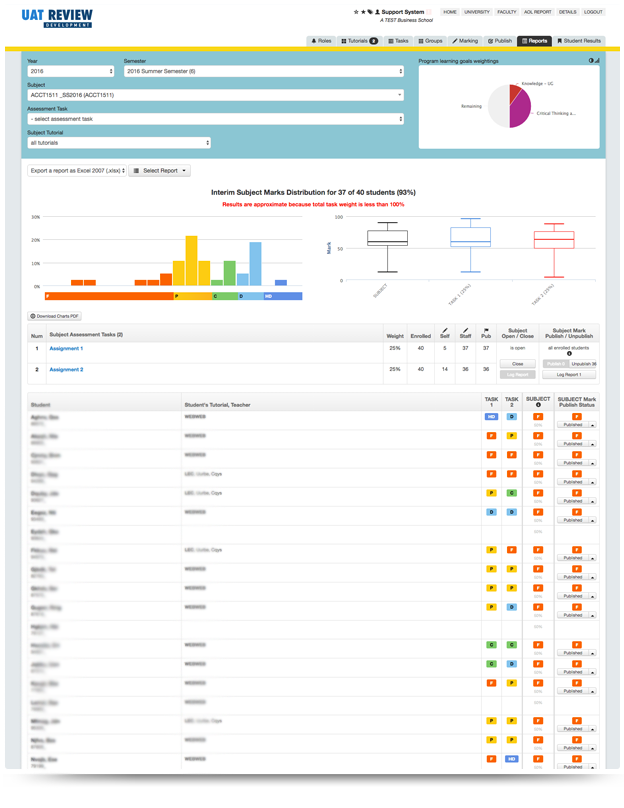WHAT is review? REVIEW is a web-based Assurance of Learning (AoL) solution, allowing Universities to automate marking of criteria-based assessment of students, formulated by program learning goals and graduate attributes.
Graduate attributes or capabilities are the qualities, knowledge and 21st Century skills students require in an ever changing world and workplace.
REVIEW is completely configurable and allows any user defined categories. One example illustrated in the diagram shows that each category can be allocated a colour and symbol as well as the usual alphanumeric course and subject codes.
REVIEW enables students to self-assess their own work against criteria linked to these categories and monitor their progress over time.
Further reading
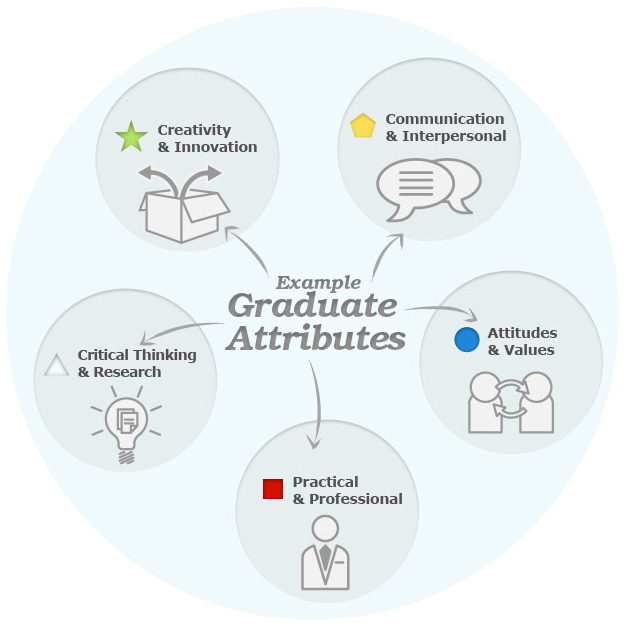
Multi-Award Winning Technology
The Learning Impact Awards recognise the most outstanding and impactful use of technology in global education
Pearson Award – Innovation in Technology Enhanced Learning
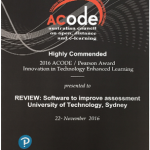 In 2016, Australia commended applicants at their Innovation in Technology Enhanced Learning Awards. Celebrating innovative practice in the field, across the Australian Tertiary Education Sector. ACODE & Pearson stated that all entries were of an exceptional standard, which was a great demonstration of the work being done by educators around Australia to help learners achieve their goals.
In 2016, Australia commended applicants at their Innovation in Technology Enhanced Learning Awards. Celebrating innovative practice in the field, across the Australian Tertiary Education Sector. ACODE & Pearson stated that all entries were of an exceptional standard, which was a great demonstration of the work being done by educators around Australia to help learners achieve their goals.
Amongst the award-winning recipients, REVIEW: Software to Improve assessment was awarded Highly Commended. Acknowledge for its successful commercial implementation into multiple universities – helping both students and academic staff align assessments with graduate attributes.
Pearson Award – Innovation in Technology Enhanced Learning
 Celebrating innovative practice in the field, across the Australian Tertiary Education Sector. ACODE & Pearson stated that all entries were of an exceptional standard, which was a great demonstration of the work being done by educators around Australia to help learners achieve their goals.
Celebrating innovative practice in the field, across the Australian Tertiary Education Sector. ACODE & Pearson stated that all entries were of an exceptional standard, which was a great demonstration of the work being done by educators around Australia to help learners achieve their goals.
Amongst the award-winning recipients, REVIEW: Software to Improve assessment was awarded Highly Commended. Acknowledge for its successful commercial implementation into multiple universities – helping both students and academic staff align assessments with graduate attributes.
Assurance of Learning
REVIEW helps you achieve AACSB Accreditation and continuous improvement in student learning and achievement
The systematic collection, review, and use of information about educational programs undertaken for the purpose of improving student learning and development.
– Polomba & Banta, 1999
Purpose
Identify opportunities to improve student learning.
The end goal is continuous improvement in student learning and achievement.
Demonstrates accountability to external constituents.
Proving leads improving the learning community
AoL is not about –
- Units of study – the focus is actually on entire programs
- Evaluating academics or teaching methods, rather the focus is on learning
- Duping accreditors or following educational trends. The system is creating genuine accountability
Further reading
Benefits of AoL
- Improve student and teaching experience
- Complements our evidence-based approach to improving quality
- Maintain prestigious accreditation –
a public assurance of quality - Lends weight to indirect measures of quality
- Programs – not just units and not just perceptions
- Academics – for rewards, data for redesign, pedagogical research, interdisciplinary dialogues
- Discipline – for leveraging grants,
attracting students into major - Faculty – for better graduates
- Employers – for better graduates
- Public – for the press in relation to standards and ethical responses and government given forthcoming TEQSA agenda
Key Features

Automatically synchronises with users

Email notifications

High level security

Self-hosted or custom hosting options

User centric

Online help

Mobile device friendly
Rebranding REVIEW
Customisable application skinning to reflect your branding.
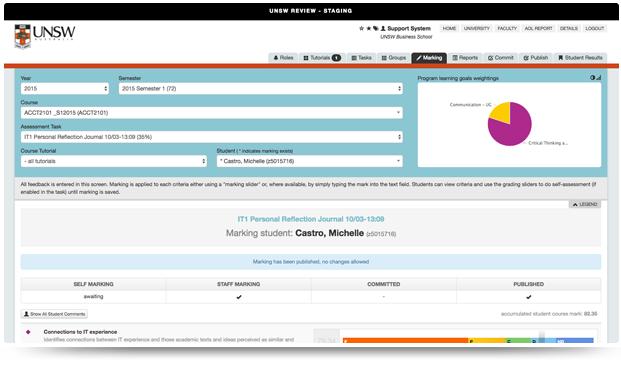
User Benefits
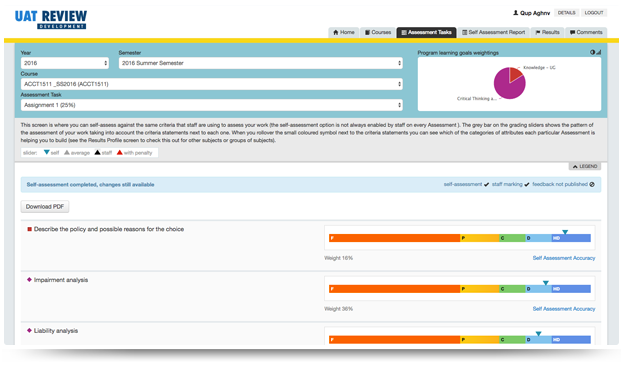
Students
- Gain insight & awareness of the specific graduate attributes to develop
- Improve your assessments through self-assessment & critical analysis
- Simple interface and navigation allowing you to access your grades easier
- Get notified instantly when your grades are ready to view
- View feedback from your tutors in line with graduate attributes
Tutors
- Web-based marking with automatic calculation against criteria
- Viewing of student’s criteria-based self-assessment after marker’s assessment to inform comments
- Ability to see other marker’s assessments and comments
- Paperless submissions and feedback
- No uncollected student feedback for important end of semester assessments
- Developed in a non-flash environment, allowing for more flexibility when editing text
- Reduction in delay of feedback returned to students
- Learning groups
Quickly view the members of a learning group by hovering on the name - Slider overload?
Marks can be manually entered if you find it easier than using the sliders. - Equal distribution
If you choose to adjust the overall mark, the adjustment will be equally distributed across all the criteria.
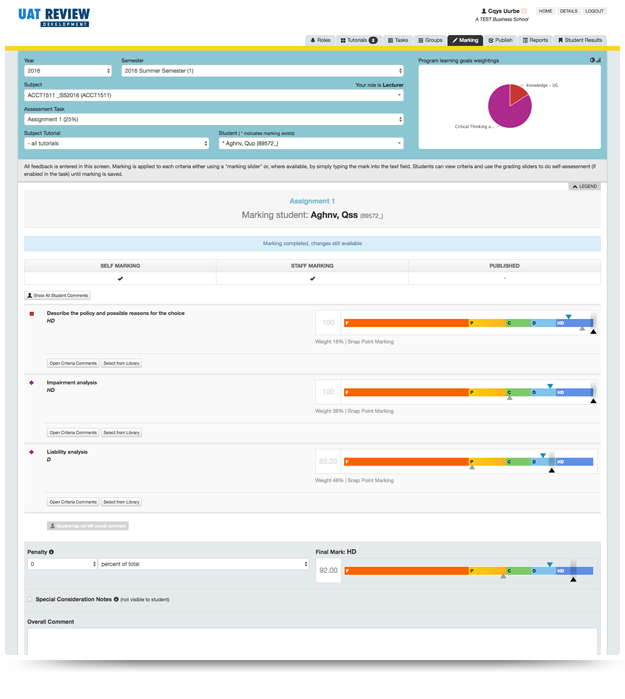
Coordinators
- Automatic creation of subjects &
enrolments - Student enrolments updated automatically so that students lists are always accurate
- Encourages revisiting of criteria often leading to improvements
- Enables direct online monitoring of marking progress – useful in large classes with multiple tutors
- Enables monitoring of marker consistency, quality of comments
- Reduces/eliminates need to return physical copies of assessment sheets
- Ability to see whether students have completed the assessment
- Exported reports contain extensive data that could be used for more detailed analysis
- Simple process for uploading percentage marks to third party vendors ie.Blackboard Grade Centre
- Customisable assessments
- Linking criteria made easy.
Explicit linking of each assessment to graduate attributes is as simple as clicking a mouse. - Overweight?
Never mind Weight-Watchers, REVIEW allows users to easily balance criteria weight either manually or by automatic distribution.
Reporting
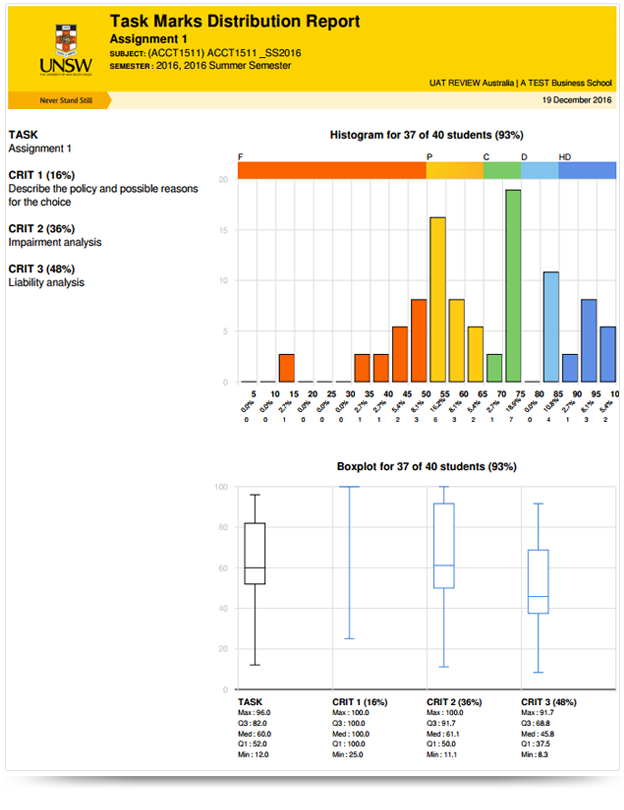
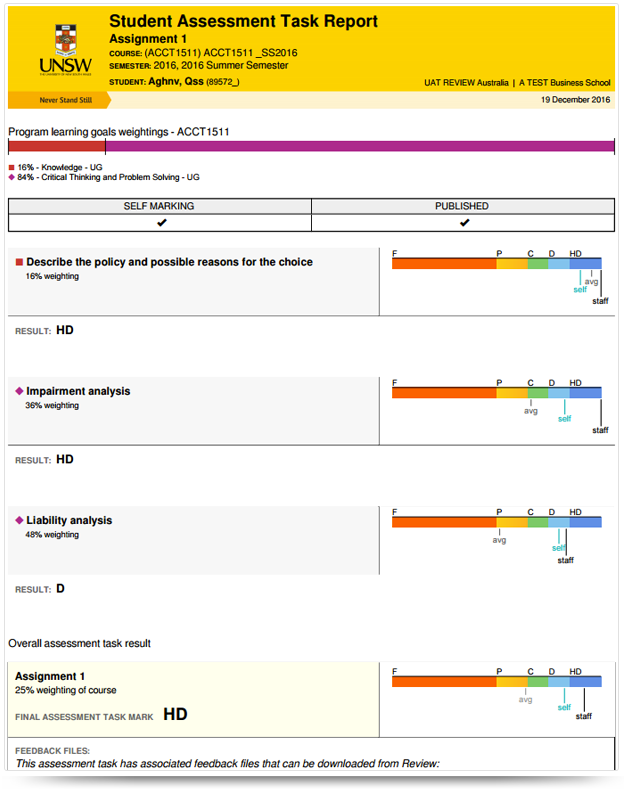
Curriculum Mapping
Curriculum mapping is a process for collecting and recording curriculum-related data that identifies core skills and content taught, processes employed,
and assessments used for each subject area and grade level. Planning a curriculum without support from the right technology can be tedious. In the past, spreadsheets, whiteboards and even sticky-notes have been used to collate and compare vital curriculum data. REVIEW provides a digital platform that simplifies this process organisation wide.
Benefits of Curriculum Mapping with Review:
- Provide Transparency: Helps faculty see relationships between course and overall program goals, and learning outcomes.
- Enhance Student Success: Gives students a better understanding of what is expected of them, and what they will accomplish from different courses and program components.
- Inform Curriculum Development: Allows for identification of gaps in course offerings as well as redundancies.
- Improve Collaboration: Increases faculty collaboration and collegiality provides an opportunity for faculty to work together.
- Track Ongoing Performance: Keep track of the alignment between graduate attributes and course goals without using cumbersome spreadsheets and countless paper documents.
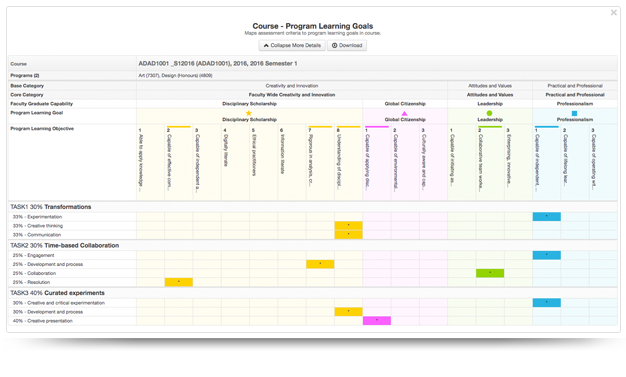
User Feedback
Academics are saying…
“REVIEW improves marking efficiency and helps me monitor and benchmark my tutor’s marking more easily.”
– UNSW Academic
“REVIEW is the most enjoyable marking experience I have had in 15 years.”
– UTS Academic
Students are saying…
“It encouraged me to critically analyse my work and made me aware of the specific graduate attributes to develop.”
– UNSW Student
“Over 60% of students surveyed agreed that self-assessment against criteria was useful.”
Feedback
 UTS academic staff identified up to 50% saving in marking time.
UTS academic staff identified up to 50% saving in marking time.
Seeing the difference between tutors and students self-assessment helps focus markers comments.
Currently used by
